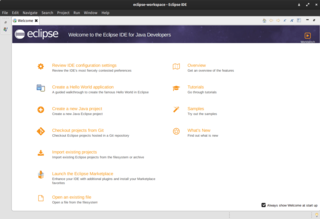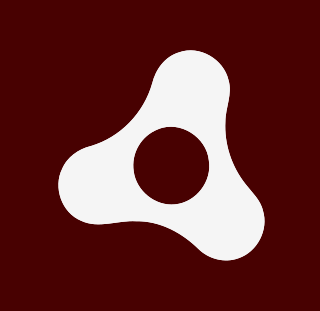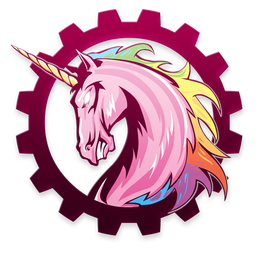In computing, cross-platform software is computer software that is designed to work in several computing platforms. Some cross-platform software requires a separate build for each platform, but some can be directly run on any platform without special preparation, being written in an interpreted language or compiled to portable bytecode for which the interpreters or run-time packages are common or standard components of all supported platforms.
A software development kit (SDK) is a collection of software development tools in one installable package. They facilitate the creation of applications by having a compiler, debugger and sometimes a software framework. They are normally specific to a hardware platform and operating system combination. To create applications with advanced functionalities such as advertisements, push notifications, etc; most application software developers use specific software development kits.

Eclipse is an integrated development environment (IDE) used in computer programming. It contains a base workspace and an extensible plug-in system for customizing the environment. It had been the most popular IDE for Java development until 2016, when was surpassed by IntelliJ IDEA. Eclipse is written mostly in Java and its primary use is for developing Java applications, but it may also be used to develop applications in other programming languages via plug-ins, including Ada, ABAP, C, C++, C#, Clojure, COBOL, D, Erlang, Fortran, Groovy, Haskell, HLASM, JavaScript, Julia, Lasso, Lua, NATURAL, Perl, PHP, PL/I, Prolog, Python, R, Rexx, Ruby, Rust, Scala, and Scheme. It can also be used to develop documents with LaTeX and packages for the software Mathematica. Development environments include the Eclipse Java development tools (JDT) for Java and Scala, Eclipse CDT for C/C++, and Eclipse PDT for PHP, among others.
Mobile app development is the act or process by which a mobile app is developed for one or more mobile devices, which can include personal digital assistants (PDA), enterprise digital assistants (EDA), or mobile phones. Such software applications are specifically designed to run on mobile devices, taking numerous hardware constraints into consideration. Common constraints include CPU architecture and speeds, available memory (RAM), limited data storage capacities, and considerable variation in displays and input methods. These applications can be pre-installed on phones during manufacturing or delivered as web applications, using server-side or client-side processing to provide an "application-like" experience within a web browser.
Selenium is an open source umbrella project for a range of tools and libraries aimed at supporting browser automation. It provides a playback tool for authoring functional tests across most modern web browsers, without the need to learn a test scripting language. It also provides a test domain-specific language (Selenese) to write tests in a number of popular programming languages, including JavaScript (Node.js), C#, Groovy, Java, Perl, PHP, Python, Ruby and Scala. Selenium runs on Windows, Linux, and macOS. It is open-source software released under the Apache License 2.0.

Adobe AIR is a cross-platform runtime system currently developed by Harman International, in collaboration with Adobe Inc., for building desktop applications and mobile applications, programmed using Adobe Animate, ActionScript, and optionally Apache Flex. It was originally released in 2008. The runtime supports installable applications on Windows, macOS, and mobile operating systems, including Android, iOS, and BlackBerry Tablet OS.
QF-Test from Quality First Software is a cross-platform software tool for automated testing of programs via the graphical user interface. The program is specialized on cross-browser test automation of static and dynamic web-based applications. Version 4.1 added support for MacOS and the Apple Safari and Microsoft Edge browsers via the Selenium WebDriver. RESTful web service testing. From version 5.0, Windows applications can also be tested and modern C++ applications. Version 5.3 added support for the Chrome DevTools protocol, which allows browsers to be controlled using CDP drivers.
Android is a mobile operating system based on a modified version of the Linux kernel and other open-source software, designed primarily for touchscreen-based mobile devices such as smartphones and tablets. Android has historically been developed by a consortium of developers known as the Open Handset Alliance, but its most widely used version is primarily developed by Google. First released in 2008, Android is the world's most widely used operating system; the latest version, released on October 15, 2024, is Android 15.

Visual Studio is an integrated development environment (IDE) developed by Microsoft. It is used to develop computer programs including websites, web apps, web services and mobile apps. Visual Studio uses Microsoft software development platforms including Windows API, Windows Forms, Windows Presentation Foundation (WPF), Microsoft Store and Microsoft Silverlight. It can produce both native code and managed code.

Sencha Touch is a user interface (UI) JavaScript library, or web framework, specifically built for the Mobile Web. It can be used by Web developers to develop user interfaces for mobile web applications that look and feel like native applications on supported mobile devices. It is based on web standards such as HTML5, CSS3 and JavaScript. The goal of Sencha Touch is to facilitate quick and easy development of HTML5 based mobile apps which run on Android, iOS, Windows, Tizen and BlackBerry devices, simultaneously allowing a native look and feel to the apps.

Android software development is the process by which applications are created for devices running the Android operating system. Google states that "Android apps can be written using Kotlin, Java, and C++ languages" using the Android software development kit (SDK), while using other languages is also possible. All non-Java virtual machine (JVM) languages, such as Go, JavaScript, C, C++ or assembly, need the help of JVM language code, that may be supplied by tools, likely with restricted API support. Some programming languages and tools allow cross-platform app support. Third party tools, development environments, and language support have also continued to evolve and expand since the initial SDK was released in 2008. The official Android app distribution mechanism to end users is Google Play; it also allows staged gradual app release, as well as distribution of pre-release app versions to testers.

Mono is a free and open-source software framework that aims to run software made for the .NET Framework on Linux and other OSes. Originally by Ximian which was acquired by Novell, it was later developed by Xamarin which was acquired by Microsoft. In August 2024, Microsoft transferred ownership of Mono to WineHQ.
Testdroid is a set of mobile software development and testing products by Bitbar Technologies Limited.

AOKP, short for Android Open Kang Project, is an open-source replacement distribution for smartphones and tablet computers based on the Android mobile operating system. The name is a play on the word kang and AOSP. The name was a joke, but it stuck. It was started as free and open-source software by Roman Birg based on the official releases of Android Open Source Project by Google, with added original and third-party code, features, and control.

Android Lollipop is the fifth major version of the Android mobile operating system developed by Google and the 12th version of Android, spanning versions between 5.0 and 5.1.1.

Android Oreo is the eighth major release and the 15th version of the Android mobile operating system.

Katalon Platform is an automation testing software tool developed by Katalon, Inc. The software is built on top of the open-source automation frameworks Selenium, Appium with a specialized IDE interface for web, API, mobile and desktop application testing. Its initial release for internal use was in January 2015. Its first public release was in September 2016. In 2018, the software acquired 9% of market penetration for UI test automation, according to The State of Testing 2018 Report by SmartBear.

Android 10 is the tenth major release and the 17th version of the Android mobile operating system. It was first released as a developer preview on March 13, 2019, and was released publicly on September 3, 2019.
HarmonyOS (HMOS) is a distributed operating system developed by Huawei for smartphones, tablets, smart TVs, smart watches, personal computers and other smart devices. It has a microkernel design with single framework: the operating system selects suitable kernels from the abstraction layer in the case of devices that use diverse resources.
SlimRoms is an Android custom ROM. Its main feature is the many setting options of the user interface. The last release was in 2018.










